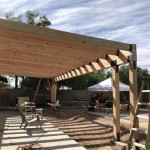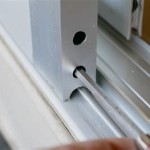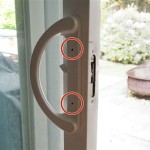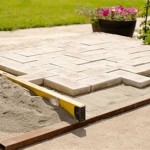Finding Reliable Patio Cover Installers Near You
Enhancing outdoor living spaces has become increasingly popular, and patio covers are a key element in creating comfortable and functional areas. Selecting the right patio cover installer is vital to ensure the project is completed correctly, on time, and within budget. This article provides a comprehensive guide to locating and evaluating qualified patio cover installers in one's local area.
The benefits of installing a patio cover extend beyond mere aesthetics. Patio covers provide protection from the elements, allowing homeowners to enjoy their outdoor spaces regardless of weather conditions. They can offer shade during hot summer months, shield from rain, and even protect patio furniture from sun damage and fading. Properly installed patio covers can also increase a home's value and add to its curb appeal, making them a worthwhile investment.
Before embarking on the search for installers, it's crucial to define the specific requirements for the patio cover project. This includes determining the desired size and style of the cover, the materials to be used (e.g., aluminum, wood, fabric), and any additional features such as lighting or ceiling fans. Having a clear understanding of these needs will streamline the selection process and enable homeowners to communicate effectively with potential installers.
Utilizing Online Resources for Finding Local Installers
The internet offers an extensive array of resources for finding patio cover installers. Online search engines are a primary starting point. Typing in keywords such as "patio cover installers near me" or "local patio cover contractors" will generate a list of businesses and websites relevant to the search. It's essential to refine the search by adding specific location details or desired materials to narrow down the results to the most suitable options.
Online directories and review platforms are also valuable tools. Websites like Yelp, Google Reviews, Angie's List, and HomeAdvisor provide listings of local businesses, along with customer reviews and ratings. These reviews offer insights into the quality of workmanship, customer service, and overall reliability of different installers. It's crucial to read a variety of reviews, both positive and negative, to gain a balanced perspective on each installer's performance.
Social media platforms can also be used to find local installers. Many contractors maintain a presence on platforms like Facebook and Instagram, showcasing their completed projects and interacting with potential customers. Searching for relevant hashtags or joining local community groups can reveal recommendations and referrals for patio cover installers.
When using online resources, it's essential to verify the information presented. Check the Better Business Bureau (BBB) website to see if any complaints have been filed against the installer. Look for installers who are licensed and insured, as this provides protection in case of accidents or damages during the installation process. It is also advisable to cross-reference information found on different websites to ensure accuracy and consistency.
Evaluating Potential Installers: Key Considerations
Once a list of potential installers has been compiled, the next step is to evaluate their qualifications and experience. This involves contacting each installer, requesting quotes, and gathering information about their services. It is crucial to ask pertinent questions to assess their suitability for the project.
One of the most important factors to consider is the installer's experience. Inquire about the number of years they have been in business and the number of patio cover installations they have completed. Ask to see examples of their previous work, either through a portfolio or by visiting completed projects. This will provide a tangible demonstration of their craftsmanship and attention to detail.
Verify that the installer is properly licensed and insured. Licensing requirements vary depending on the location, but typically involve passing an examination and meeting certain qualifications. Insurance coverage, including general liability and workers' compensation, protects the homeowner from financial liability in case of accidents or damages during the installation process. Request copies of the installer's licenses and insurance certificates to ensure they are up-to-date and valid.
Obtain multiple quotes from different installers. Compare the quotes carefully, paying attention not only to the price but also to the scope of work included. A lower price may be attractive, but it's essential to ensure that all necessary tasks and materials are included in the quote. Ask for a detailed breakdown of the costs, including materials, labor, permits, and any other associated fees.
Check references from previous clients. Contacting former customers provides valuable insights into the installer's reliability, professionalism, and quality of work. Ask specific questions about their experience with the installer, such as whether the project was completed on time and within budget, whether there were any issues or problems, and whether they would recommend the installer to others.
Assess the installer's communication skills and customer service. A reputable installer should be responsive to inquiries, provide clear and concise information, and be willing to answer questions thoroughly. They should also be professional and courteous in their interactions. Strong communication and customer service skills are indicative of a reliable and trustworthy installer.
Understanding Patio Cover Materials and Design Options
Selecting the right materials for a patio cover is crucial for ensuring its durability, aesthetics, and functionality. Various materials are available, each with its own advantages and disadvantages. The choice of material will depend on factors such as budget, climate, architectural style, and personal preferences.
Aluminum is a popular choice for patio covers due to its lightweight nature, resistance to corrosion, and low maintenance requirements. Aluminum covers are available in a variety of styles and colors, and can be customized to match the existing architecture of the home. They are also relatively affordable compared to other materials.
Wood offers a natural and aesthetically pleasing look, adding warmth and character to outdoor spaces. Wood covers can be constructed from various types of wood, such as cedar, redwood, or pressure-treated lumber. However, wood requires regular maintenance, including staining or painting, to protect it from the elements and prevent rot or decay.
Fabric awnings are a versatile and cost-effective option for providing shade and protection from the sun. Fabric awnings are available in a wide range of colors, patterns, and styles, and can be easily retracted or extended as needed. However, fabric awnings are less durable than aluminum or wood covers and may require replacement more frequently.
Polycarbonate panels are a lightweight and durable option that allows natural light to filter through while providing protection from rain and UV rays. Polycarbonate covers are available in various tints and thicknesses, and can be used in conjunction with other materials, such as aluminum or wood.
In addition to the choice of materials, design options also play a significant role in the overall appearance and functionality of the patio cover. Common design options include attached or detached covers, solid or lattice roofs, and various shapes and sizes. The design should complement the existing architecture of the home and provide the desired level of shade and protection.
Obtaining professional advice from a qualified installer can be beneficial in selecting the right materials and design options. A reputable installer will be able to assess the specific needs and preferences of the homeowner and recommend the most suitable solutions.
Securing necessary permits is a crucial step in the patio cover installation process. Building codes and zoning regulations vary depending on the location, and it's essential to comply with all applicable requirements. A qualified installer will be familiar with the local permitting process and can assist the homeowner in obtaining the necessary approvals. Failure to obtain permits can result in fines or other penalties.
The installation of a patio cover requires specialized skills and knowledge. It's essential to choose an installer who has the expertise and experience to complete the project correctly and safely. A well-installed patio cover will provide years of enjoyment and enhance the value of the home.

Patio Covers Final Touch Construction

Patio Cover Installation In Colorado Springs Krueger Brothers Construction

Expert Patio Cover Installers Southern Home Improvement

Aluminum Patio Covers Carports Santee Ca City

Patio Cover Company Little Elm A Better Fence Pergolas Arbors Deck

Patio Roof Installers Near Me Warehouse

Aluminum Patio Covers Cover West Sacramento Citrus Heights Solid Top Lattice Or Combination Western Sky Ca

Renaissance Patio Outdoor Coverings Patios Pergolas

Patio Covers Custom Cover Shade Structures Installation

Patio Covers Near Roseville Ca Top Cover Installers
Related Posts








